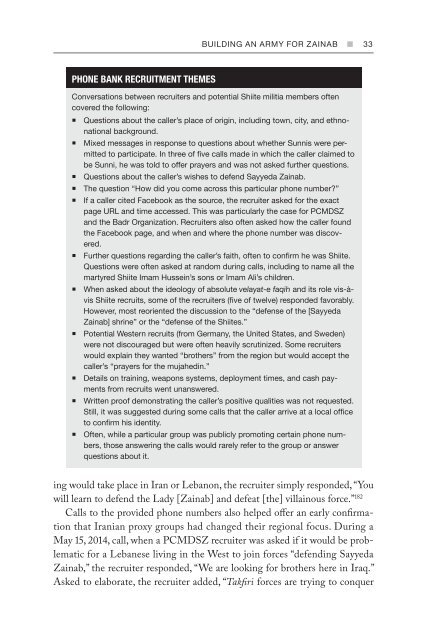You also want an ePaper? Increase the reach of your titles
YUMPU automatically turns print PDFs into web optimized ePapers that Google loves.
BUILD<strong>IN</strong>G AN ARMY FOR ZA<strong>IN</strong>AB n 33<br />
PHONE BANK RECRUITMENT <strong>THE</strong>MES<br />
Conversations between recruiters and potential Shiite militia members often<br />
covered the following:<br />
• Questions about the caller’s place of origin, including town, city, and ethnonational<br />
background.<br />
• Mixed messages in response to questions about whether Sunnis were permitted<br />
to participate. In three of five calls made in which the caller claimed to<br />
be Sunni, he was told to offer prayers and was not asked further questions.<br />
• Questions about the caller’s wishes to defend Sayyeda Zainab.<br />
• The question “How did you come across this particular phone number?”<br />
• If a caller cited Facebook as the source, the recruiter asked for the exact<br />
page URL and time accessed. This was particularly the case for PCMDSZ<br />
and the Badr Organization. Recruiters also often asked how the caller found<br />
the Facebook page, and when and where the phone number was discovered.<br />
• Further questions regarding the caller’s faith, often to confirm he was Shiite.<br />
Questions were often asked at random during calls, including to name all the<br />
martyred Shiite Imam Hussein’s sons or Imam Ali’s children.<br />
• When asked about the ideology of absolute velayat-e faqih and its role vis-àvis<br />
Shiite recruits, some of the recruiters (five of twelve) responded favorably.<br />
However, most reoriented the discussion to the “defense of the [Sayyeda<br />
Zainab] shrine” or the “defense of the Shiites.”<br />
• Potential Western recruits (from Germany, the United States, and Sweden)<br />
were not discouraged but were often heavily scrutinized. Some recruiters<br />
would explain they wanted “brothers” from the region but would accept the<br />
caller’s “prayers for the mujahedin.”<br />
• Details on training, weapons systems, deployment times, and cash payments<br />
from recruits went unanswered.<br />
• Written proof demonstrating the caller’s positive qualities was not requested.<br />
Still, it was suggested during some calls that the caller arrive at a local office<br />
to confirm his identity.<br />
• Often, while a particular group was publicly promoting certain phone numbers,<br />
those answering the calls would rarely refer to the group or answer<br />
questions about it.<br />
ing would take place in Iran or Lebanon, the recruiter simply responded, “You<br />
will learn to defend the Lady [Zainab] and defeat [the] villainous force.” 182<br />
Calls to the provided phone numbers also helped offer an early confirmation<br />
that Iranian proxy groups had changed their regional focus. During a<br />
May 15, 2014, call, when a PCMDSZ recruiter was asked if it would be problematic<br />
for a Lebanese living in the West to join forces “defending Sayyeda<br />
Zainab,” the recruiter responded, “We are looking for brothers here in Iraq.”<br />
Asked to elaborate, the recruiter added, “Takfiri forces are trying to conquer


